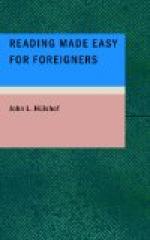During the third century there was a long struggle to see which nation should rule in America. England and France were far ahead of the others, but which of them should it be? The French and Indian Wars gave the answer, “England.” Then another question arose; should it be England or the Thirteen Colonies? The Revolutionary War answered, “The Colonies.” At the end of the third century the United States had been established, and the land east of the Mississippi was under her rule.
In the last century there has been a great gain in people and in land. To-day there are thirty times as many people in this country as there were then.
USEFUL INFORMATION
It may not be generally known that we have in the nickel five-cent piece of our American coinage a key to the tables of linear measures and weights. The diameter of a nickel is exactly two centimeters, and its weight is five grammes. Five nickels in a row will give the length of the decimeter, and two of them will weigh a decagram. As the kiloliter is a cubic meter, the key of the measure of length is also that of capacity.
Among the North American Indians polished shells were used as currency. This money was called wampum and was recognized by the colonists. Six white shells were exchanged for three purple beads, and these in turn were equivalent to one English penny.
LESSON LVI
OUR COUNTRY TO-DAY
PART II
How has it come about that the number of people in the United States has increased with such rapidity? It is partly because more have been born than have died, and partly because so many have come from foreign countries. Fifty years ago large villages were common in which there were hardly any foreigners. Now one-sixth of the whole number of inhabitants of the United States are people who were born in some other country.
These people are glad to come because the workingmen of America receive higher wages than those of any other country, and because in America a man is free to rise to any position that he is fitted to hold. The country is ready to give the education that will prepare her citizens to rise to high positions. It is believed that an educated man is likely to make a better citizen than an ignorant man, and therefore the public schools of the United States are entirely free. Then, too, there are public libraries not only in the cities but in many of the little villages, so that men who are too old to go to school may educate themselves by reading. There is opportunity to use all kinds of knowledge in carrying on the manufactures of the country. Almost everything that used to be made by hand is now made by machinery, and the skill to invent a machine that will work a little better than the one in use is always well rewarded. Knowledge is also needed to develop the mineral wealth of the country. Within the limits of the United States are metals, coal, natural gas, and petroleum, and it is the skill and inventive genius of her citizens that have brought such great wealth to the country from these products.




